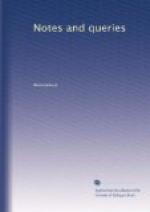Sir,—My best apology for troubling you with such a lengthened Query is, that it will serve, to some extent, as a Note. Will any of your correspondents inform me of any additions to the following list of translations of Gray’s Elegy? It may possibly be more incomplete than I am aware of, as it is drawn up, with two exceptions, from copies in my own library only.
Greek:
1. By Professor
Cooke, printed with his edition of Aristotle’s
Poetics, Cantab.
1775. It begins:—
[Greek: “Nux pelei, oud an agros pura kaietai, oud ana komas.”]
2. By Dr. Norbury. 4to. Eton. 1793:—
[Greek: “Atgellei kodon barus aeelion katadunta.”]
3. By Dr. Sparke, Bishop of Ely. 4to. Lond. 1794:—
[Greek: “Kodon aematos oichomenoio baruktupos aechei.”]
4. By Dr. Coote. 4to. Lond. 1794:—
[Greek: “Kodon daeta, phaous tekmor apiontos, epaechei.”]
5. By Stephen Weston. 4to. London, 1794:—
[Greek: “Aematos oichomenoio boai chalkos baruaechaes.”]
6. By Edward Tew. 4to. Lond. 1795:—
[Greek: “Tael’ aechei kodon neon aematos anomenoio.”]
There is also a Greek version of the epitaph only, by J. Plumptre, printed with his Greek version of Pope’s Messiah. 4to. 1795. In a biographical notice of Dr. Sparke, it is stated that he was among the thirteen candidates when the competition took place for the best translation of Gray’s Elegy into Greek. Query, what was this competition, and were any of the other versions published?
Latin:
1. By Lloyd.
Query, when and where originally published? My
copy,
which is among some
collections of the late Mr. Haselwood, appears
to have been cut out
of a Dublin edition. It begins:—
“Audistin! quam lenta sonans campana per agros.”
2. By Signor Gio. Costa. 12mo. In Eblana, 1776:—
“AEs triste ingeminat cedentis signa diei.”
3. By Gilbert Wakefield,
in his “Poemata partim scripta, partim
reddita.”
Cambridge, 1776:—
“Vesper adest, lugubre sonat Campanula; tardis.”
4. By C.A. et W.H.R.
[C. Anstey and W.H. Roberts.] 4to. London,
1778:—
“Ingeminat signum occiduae Campana diei.”
5. The last-mentioned
version originally appeared anonymously in a
somewhat different form
(4to. Cantab. 1762), the first line
being:—
“Audin’ ut occiduae signum Campana diei.”
6. An anonymous version, “by a member of the University of Cambridge,” printed with the French translation of M. Guedon de Berchere, mentioned below. I have no copy, and do not know the opening line.
7. By S.N.E. 4to.
London, 1824. Query, the name of the author.
It
may perhaps appear on
the title-page, which is wanting in my
copy:—




